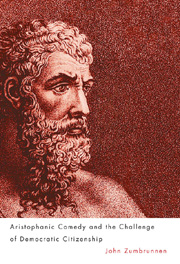Book contents
- Frontmatter
- Contents
- Acknowledgments
- Introduction
- 1 Peaceful Voyages: Peace and Lysistrata
- 2 Ordinary Citizens, High Culture, and the Salvation of the City: Clouds, Women at the Thesmophoria, and Frogs
- 3 Archē and the Anger of the Ordinary Citizen: Wasps and Birds
- 4 Elite Domination and the Clever Citizen: Acharnians and Knights
- 5 Fantasy, Irony, and Economic Justice: Assemblywomen and Wealth
- Conclusion: Democratic Possibilities
- Notes
- Bibliography
- Index
2 - Ordinary Citizens, High Culture, and the Salvation of the City: Clouds, Women at the Thesmophoria, and Frogs
Published online by Cambridge University Press: 05 February 2013
- Frontmatter
- Contents
- Acknowledgments
- Introduction
- 1 Peaceful Voyages: Peace and Lysistrata
- 2 Ordinary Citizens, High Culture, and the Salvation of the City: Clouds, Women at the Thesmophoria, and Frogs
- 3 Archē and the Anger of the Ordinary Citizen: Wasps and Birds
- 4 Elite Domination and the Clever Citizen: Acharnians and Knights
- 5 Fantasy, Irony, and Economic Justice: Assemblywomen and Wealth
- Conclusion: Democratic Possibilities
- Notes
- Bibliography
- Index
Summary
In the Poetics, Aristotle insists that the characters of tragic poetry must be “good [chrēsta].” He immediately goes on to say that this goodness is “relative to each class of people” (1454a). By this he means, for example, that women in tragedy must only be good as women, not good according to the standards of goodness for men. Later, he indicates a second sense in which the goodness of tragic characters is relative. They must be “better [beltion] than ourselves” (1454b). We are left, then, with the conclusion that, though they need not be good in any absolute sense, men in tragedies must be better than the men we see around us, women in tragedies must be better than the women we see around us, and so on. All this, for Aristotle, is necessary if tragic characters are to engage in the “serious [spoudaious]” sort of action proper to tragedy.
In describing the characters of comedy, Aristotle likewise chooses a term that suggests something relative rather than absolute. Comedy, he tells us, “is a representation of inferior people [phauloterôn].” The Greek word rendered here as “inferior,” a comparative form of phaulos, can hint at a potentially more generous evaluation. In reference to either people or things, phaulos often does mean “inferior” or, more strongly, “mean” or even “bad.” It can also, though, suggest “easy” or “slight” or “indifferent.” At times it takes on a more positive sense, particularly in regard to people who are “simple” or “unaffected” or simply-in the language I use in this book-“ordinary.”
- Type
- Chapter
- Information
- Publisher: Boydell & BrewerPrint publication year: 2012



